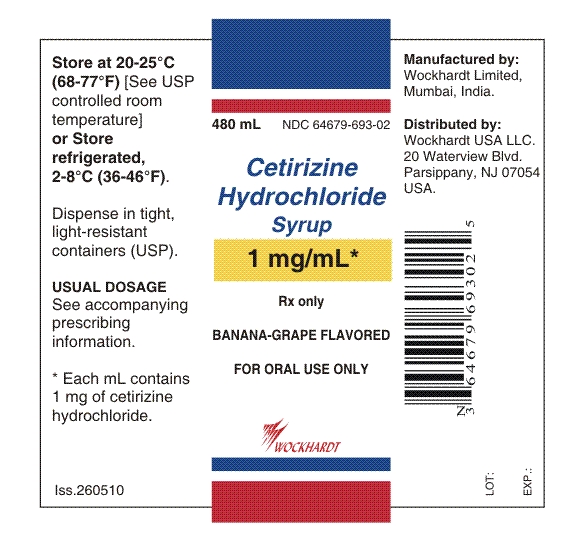Cetirizine Hydrochloride Syrup while Breastfeeding

What is Cetirizine Hydrochloride Syrup used for?
Perennial Allergic Rhinitis Cetirizine hydrochloride syrup is indicated for the relief of symptoms associated with perennial allergic rhinitis due to allergens such as dust mites, animal dander and molds in children 6 to 23 months of age. Symptoms treated effectively include sneezing, rhinorrhea, postnasal discharge, nasal pruritus, ocular pruritus, and tearing.
Chronic Urticaria Cetirizine hydrochloride syrup is indicated for the treatment of the uncomplicated skin manifestations of chronic idiopathic urticaria in children 6 months to 5 years of age. It significantly reduces the occurrence, severity, and duration of hives and significantly reduces pruritus.
I am breastfeeding mother and I am using Cetirizine Hydrochloride Syrup. Can it have any bad effect on my kid? Shall I search for better alternative?

Cetirizine Hydrochloride Syrup Breastfeeding Analsys
Cetirizine hydrochloride while Breastfeeding
SafeCAS Number: 83881-52-1
Second generation antihistamine, drug derived from piperazine and metabolite of hydroxyzine, with a minimal sedative effect and low toxicity even at higher dose. No short or long-term side effects were found in an infant with a mother who was treated in the first month post delivery for pemphigus (Westermann 2012). Because of a high plasma protein binding capacity, excretion into breast milk seems to be unlikely. The British Society for Allergy and Clinical Immunology and other experts rates it as compatible with breastfeeding (Butler 2014, Powell 2007).
Cetirizine Hydrochloride Syrup Breastfeeding Analsys - 2
Cetirizine hydrochloride while Breastfeeding
CAS Number: 83881-51-0
Small occasional doses of cetirizine are probably acceptable during breastfeeding. Larger doses or more prolonged use may cause drowsiness and other effects in the infant or decrease the milk supply, particularly in combination with a sympathomimetic such as pseudoephedrine or before lactation is well established. The British Society for Allergy and Clinical Immunology recommends cetirizine at its lowest dose as a preferred choice if an antihistamine is required during breastfeeding.[1] Cetirizine has been used successfully in cases of persistent pain of the breast during breastfeeding.[2] Ophthalmic use of cetirizine by the mother should pose little risk to the breastfed infant. To substantially diminish the amount of drug that reaches the breastmilk after using eye drops, place pressure over the tear duct by the corner of the eye for 1 minute or more, then remove the excess solution with an absorbent tissue.
What should I do if I am breastfeeding mother and I am already exposed to Cetirizine Hydrochloride Syrup?
As usage of Cetirizine Hydrochloride Syrup is mostly safe while breastfeeding hence there should not be any concern. In case of any change in behavior or health of your baby you should inform your health care provider about usage of Cetirizine Hydrochloride Syrup else no further action is required.
I am nursing mother and my doctor has suggested me to use Cetirizine Hydrochloride Syrup, is it safe?
Definitely, Cetirizine Hydrochloride Syrup is safe in lactation for baby. No wonder your doctor has recommended it.
If I am using Cetirizine Hydrochloride Syrup, will my baby need extra monitoring?
No extra baby monitoring required while mother is using Cetirizine Hydrochloride Syrup
Who can I talk to if I have questions about usage of Cetirizine Hydrochloride Syrup in breastfeeding?
US
National Womens Health and Breastfeeding Helpline: 800-994-9662 (TDD 888-220-5446) 9 a.m. and 6 p.m. ET, Monday through Friday
UK
National Breastfeeding Helpline: 0300-100-0212 9.30am to 9.30pm, daily
Association of Breastfeeding Mothers: 0300-330-5453
La Leche League: 0345-120-2918
The Breastfeeding Network supporter line in Bengali and Sylheti: 0300-456-2421
National Childbirth Trust (NCT): 0300-330-0700
Australia
National Breastfeeding Helpline: 1800-686-268 24 hours a day, 7 days a week
Canada
Telehealth Ontario for breastfeeding: 1-866-797-0000 24 hours a day, 7 days a week
